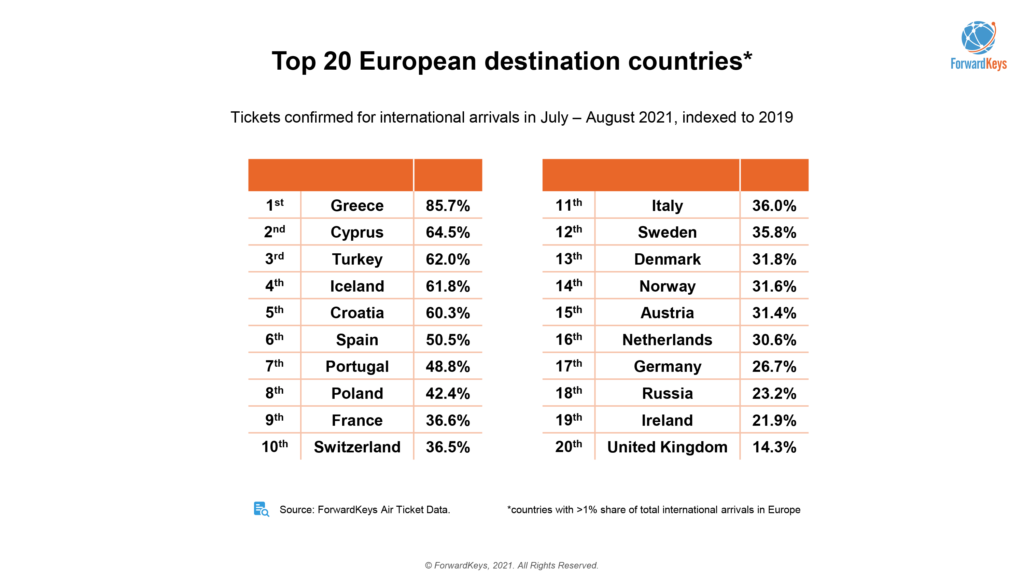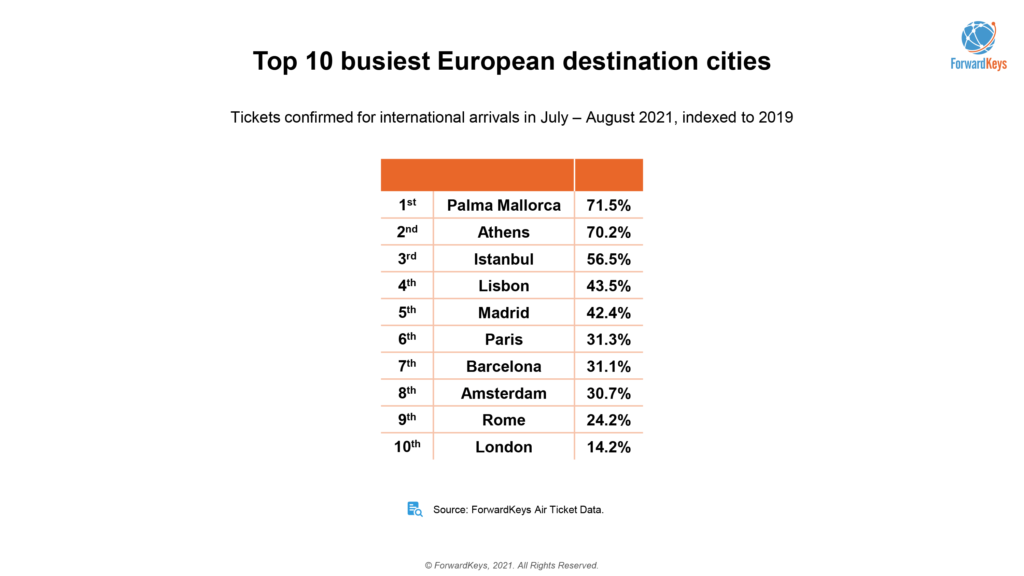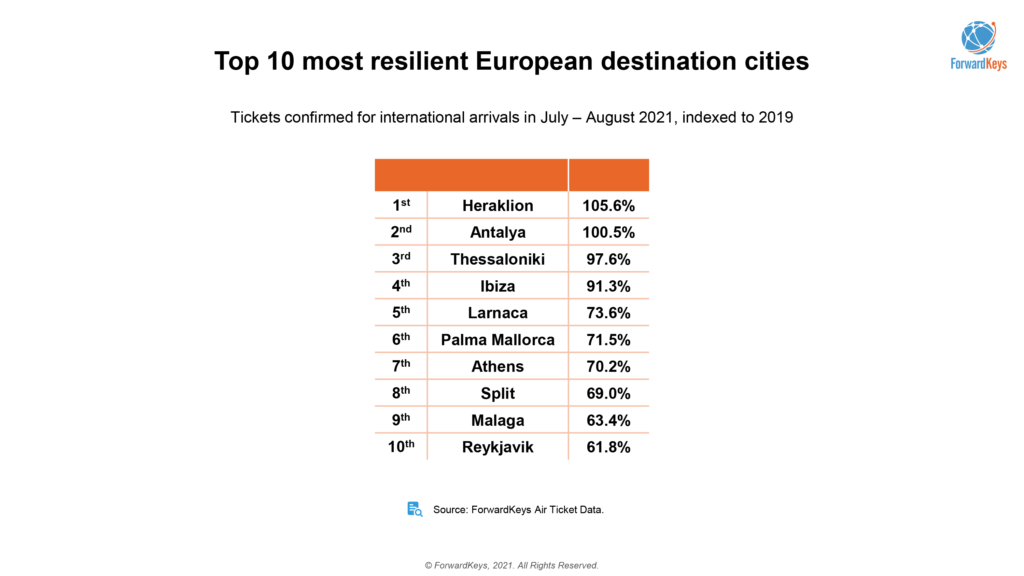Looking back on 2021, forecasts for 2022
Europe’s tourism recovery for summer 2021 was muted at best. However, comparing it to 2019 showcases a gradual return to form while looking ahead to winter 21/22 the improvements continue to gather pace. A number of recent regional data insights give us cause for cautious optimism.
New research from Echolution’s travel bookings foresight partner, ForwardKeys reveals that international flights to European destinations in July and August 2021 reached 39.9% of pre-pandemic levels. This is significantly better than last year (which was 26.6%) when the pandemic caused widespread lockdowns, and vaccines were not yet approved.
However, the picture was very mixed, with some destinations doing considerably better than others. The outlook is also not improving, as bookings slowed towards the end of the summer period.
Looking at performance by country, Greece was the stand-out. It achieved 86% of July and August arrivals in 2019. It was followed by Cyprus, which achieved 64.5%, Turkey, 62.0% and Iceland, 61.8%. Greece and Iceland were amongst the first countries to make widely publicised claims that they would accept visitors who had been fully vaccinated and/or could show a negative PCR test or could show proof of recovering from COVID-19.
The countries which fared worst were those which rely more on long haul tourism, such as France and Italy and those which imposed the most ‘onerous and volatile’ travel restrictions such as the UK, which languished at the bottom of the list, achieving just 14.3% of 2019 levels for the same high-summer two-month period.

Excluding low-cost carriers, intra-European flights made up 71.4% of arrivals, compared with 57.1% in 2019. The relative disappearance of long-haul visitors, who typically stay longer, spend more, and focus their attention on cities and sightseeing, was underlined in rankings of the best and worst-performing local destinations.
Travel to London was particularly disappointing; it was at the bottom of the list of busiest European cities, achieving just 14.2% of 2019 arrivals.
Beach resorts & leisure destinations
In comparison to the long-haul and city break cohort of travellers, beach resorts and leisure destination gateways headed the top 10 summer hitlist for holidaymakers choosing European destinations.

That list was headed by Palma Mallorca, reaching 71.5% of 2019 levels and by Athens, at 70.2%. The next best performing destinations were Istanbul, 56.5%, Lisbon, 43.5%, Madrid, 42.4%, Paris, 31.2%, Barcelona, 31.1%, Amsterdam, 30.7% and Rome, 24.2%.

By comparison, leisure destinations proved to be much more resilient. A ranking of all major local destinations (those with a market share over 1%) was dominated by traditional coastal holiday hotspots or the gateway to them. The leaders were Heraklion and Antalya, which exceeded pre-pandemic levels by 5.8% and 0.5% respectively. They were followed by Thessaloniki, 98.3%; Ibiza, 91.8%; Larnaca, 73.7% and Palma Mallorca, 72.5%.

Aside from the macro trends, certain destinations fared relatively better or worse for more locally specific reasons. For example, Portugal, which is a favourite destination of UK holidaymakers, suffered when the UK changed its designation from green to amber in June; and Spain suffered at the end of July when Germany warned against all but essential travel.
Olivier Ponti, VP Insights, ForwardKeys commented: “When one considers how dreadful things were for tourism in Europe last year, this summer has been a very modest recovery story. Benchmarked against normal times, the continued low intensity of international air travel, less than 40% of normal, has been extremely damaging for the aviation industry. The continued absence of long-haul travellers, particularly from the Far East (it reached just 2.5% of pre-pandemic volumes this summer) will prove a severe blow to the visitor economy of several European countries.”
He concluded: “If there is an element of consolation, it is people ‘staycationing’, ie: taking a holiday in their own country. While domestic aviation has a minority share of the market in Europe in normal times, it has held up much better during the pandemic because it has not been subject to such challenging travel restrictions. For example, the Canaries and the Balearics welcomed more Spanish visitors than they do in a normal season.”
Summer 2022 forecast
The value holidaymakers are putting on their holiday plans for next year is being shown in the latest data from holiday comparison site icelolly.com.

The firm’s latest Pulse tracker shows consumers are shifting their focus forward – to winter 2021 and summer 2022 trips as the summer 2021 season ends.
Icelolly.com’s tracker report highlights that summer 2022 searches account for around a third of the total, while actual bookings differential value is growing between this year and next.
On average the value of bookings being taken for 2022 were two-and-a-half times higher in the first week of September compared to 2021 bookings.
Chris Webber, Head of Travel Deals at icelolly.com, said: “There’s been a shift in search and bookings to later in 2021 and to summer 2022, with November and December 2021 travel both seeing search share increases.
“Those looking to get away in September and October this year are favouring the likes of Majorca, Tenerife and Corfu.
“The difference in average booking value between this summer and next is also growing; summer 2022 bookings were on average worth two-and-a-half times the value of a summer 2021 booking.”
December 2021 saw the biggest percentage increase in search share, week on week (+41%) while October and November 2021 also had increases of around 30%.
According to the icelolly.com research, The Canary Islands that feature in the top 10 all grew search share, with Lanzarote the biggest gainer up 20%; outside the top 10, Croatia was the biggest search share gainer (up 32% week-on-week).
Winter bookings 2021/2022
While it’s too early to start analysing ForwardKeys’ future bookings for summer 2022 (any meaningful traveller numbers are not yet booked), the outlook for winter 2021/2022 looks better than this time last year.
Taking a closer look at forward bookings for just some of the most popular leisure tourist destinations in Europe over summer 2021, travellers are gaining confidence and thinking about winter sun.
Taking Greece as an example, September, October, November and December bookings are currently up 89.1%, 100.6%, 100.4% and 46.1% respectively compared to the same months in 2020. Meanwhile, when we compare the same months to pre-pandemic travel in 2019, the bookings are still negative, but improving. For September, October, November and December bookings are currently down 27.7%, 39.4%, 64.1% and 51% respectively.
Similarly for the Canary Islands, September, October, November and December bookings are currently up 149.7%, 129.1%, 133.3% and 113.9% respectively compared to the same months in 2020. These months’ bookings are also improving against 2019 levels with September, October, November and December currently tracking at 31.6%, 26.5%, 20.9% and 20.6% respectively.
Moving away from the beach and onto the slopes for the popular skiing month of February 2022, forward bookings are looking better than this time last year, especially for destinations such as the Alps in France, which is tracking at 97.7% and 122.9% up for January and February respectively vs 2021. For the same location comparison pre-pandemic, bookings for these months are down just 32.9% and 20.1% vs 2020.

Low cost carriers remain front runners for recovery traffic
Ryanair is expecting a “very strong recovery” in European short-haul flights over the coming autumn and winter season, according to its chief executive, Michael O’Leary.
Europe’s largest carrier by passenger volume, predicts it will fly a total of 10.5 million passengers a month over the next three months. It has also announced new routes commencing between October through December to Spain, Gran Canaria, Naples, Grenoble, Helsinki and Stockholm.
According to the mid-2021 report, ‘Skyscanner Horizons – The Return of Travel’ the second half of the year will see budget travel carriers benefitting more than most airlines.
Derek Sadubin, Managing Director of CAPA – Centre for Aviation, commented on cheaper prices for travellers and lowering yields from airlines: “Leisure traffic and VFR, the low yielding segments for airlines will dominate travel profiles for the remainder of 2021 and beyond. Fewer business travellers, the key to long-haul full-service operations, will take longer to take to the skies, so the leisure/VFR markets, particularly domestic and short-haul international, will be in the ascendency. For the airlines in this environment, low costs are king, so LCCs are well positioned.”
Travel dates are being pushed back to later in the year with September, October and November 2021, comparatively more popular than two years ago, according to the Skyscanner research. Searches for medium-haul flights are also higher (+11%) compared to 2019; 39% of consumers are planning trips for longer than 14 days, with extended holidays (56%) and visiting friends and family (52%) the top reasons.
New hope for lacklustre recovery to gain pace
With news this week that the UK government’s travel traffic light system is likely to be scrapped or significantly changed, travel industry commentators have said a new travel rules system of ‘red or not’ will mean ‘only vaccination status will count’ for travellers. This sweeping change could mean a potential psychological boost (especially in Europe) for many travellers who considered travel to ‘amber’ countries too risky.
Echolution takeouts:
Travellers are gaining confidence and forward bookings are gathering momentum for the upcoming autumn and winter vacation seasons. For Europe, the key winter sun and ski destinations remain top of mind as pent-up demand gathers pace in the short term, and ‘revenge-travel’ bookings become more likely as the summer 2022 season takes shape.
Echolution has partnered with ForwardKeys to enhance travel retail brands’ strategic marketing capabilities, combining future travel bookings analysis with programmatic media segmentation specialism.




